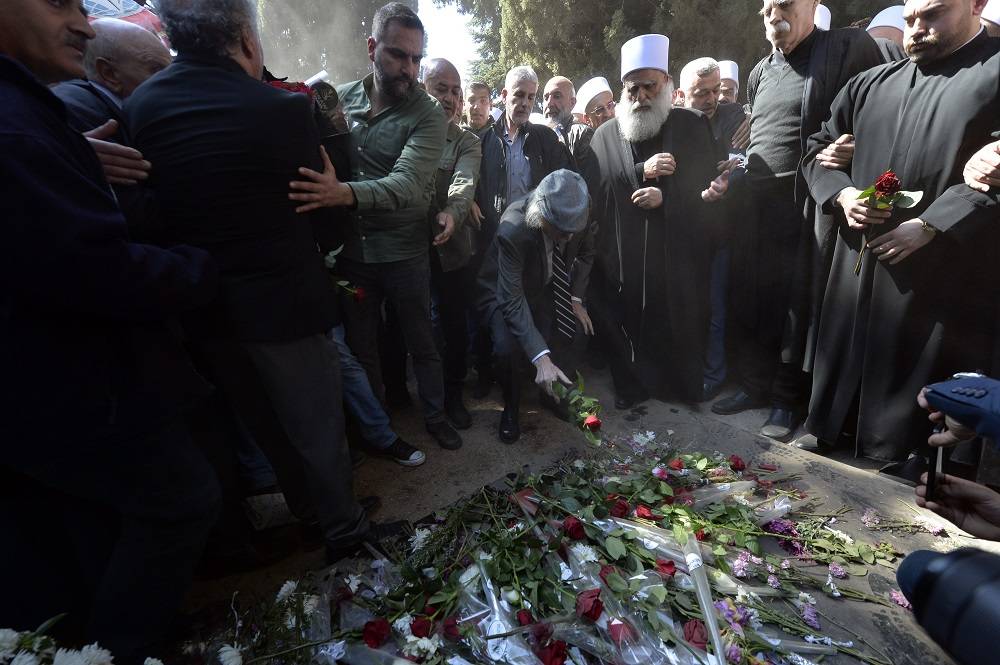Former head of Lebanon Progressive Socialist Party (PSP) and Druze leader Walid Jumblatt announced on Sunday he was ending the annual commemoration of the assassination of his father, Kamal, “after historic justice has taken its course.”
Jumblatt had been holding the commemoration annually since his father was assassinated by the now ousted Syrian regime on March 16, 1977.
Earlier this month, the new authorities in Syria announced the arrest of former chief of intelligence Ibrahim Huweija, who is accused of “hundreds of assassinations” under the Assad regime. He had overseen Kamal Jumblatt’s assassination.
Politicians, Druze figures and supporters across Lebanon had gathered at Mokhtara on Sunday for the 48th anniversary of the assassination.
Addressing the crowd, Jumblatt declared: “For 48 years, we had gathered on March 16 to read the Fatiha and place a red rose on Kamal Jumblatt’s grave and the grave of his companions Hafez al-Ghosseini and Fawzi Chedid. This was an occasion to forge ahead in defiance and confrontation.”

“During the worst of times, it was an occasion to remember and persevere, derive strength to continue living,” he added.
“Now, freedom shines in Syria at long last. The regime of oppression and injustice has collapsed after some 54 years. The Syrian people are free and the new authorities led by President Ahmed al-Sharaa have arrested the man behind Kamal Jumblatt’s assassination,” he added.
“On behalf of my family and the PSP, I declare an end to the tradition of holding the commemoration given that historic justice has taken its course albeit after some time,” he stressed.
Jumblatt said: “Mokhtara is looking forward to a new chapter in struggle and defiance in new areas, not limited to, more humanitarian socialism as advocated by Kamal Jumblatt.”
He underlined the historic reconciliation in Lebanon on August 3, 2001, that was sponsored by late Maronite Patriarch Nasrallah Sfeir. The agreement lays the foundation for intra-Lebanese relations that rise above political divisions.
He also underscored the importance of “clinging on to Lebanon’s Arab identity as promoted by major thinkers, writers, politicians and nationalists. This identity has been tarnished by regimes of oppression.”
Jumblatt also stressed the need to liberate southern Lebanon from Israeli occupation, the demarcation of the border to protect Lebanese sovereignty, implementation of international resolutions, and the reconstruction of areas destroyed by the Israeli war on Hezbollah last year.

Moreover, he called for “rebuilding Lebanese-Syrian relations on new foundations away from past experiences.”
Turning to the Druze community, he urged them to “maintain their Arab identity and protect their history of joint struggle with Arab and Syrian nationalists against colonization. Maintain your position in confronting the occupation of Arab territories in the Syrian Golan Heights.”
Commenting on the visit by Syrian Druze clerics to Israel last week, he said: “Religious visits do not negate the occupation of Palestine and the Golan.”
He called on the Druze to “preserve their Islamic heritage,” warning them against being influenced by Zionism. He also warned them against being manipulated “to divide Syria and the rest of the region under the pretext of the alliance of minorities that was opposed by Kamal Jumblatt – a stance for which he paid for with his life.”
At the end of his speech, Jumblatt declared: “We were patient, persevered and were victorious.”









